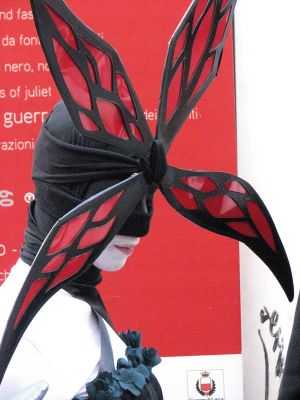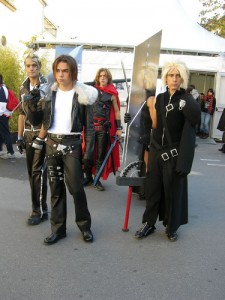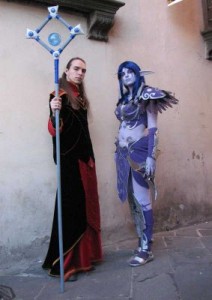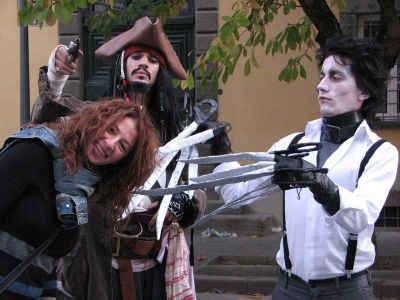It’s not everyday that you can stroll along the historic walls of Lucca and encounter Spiderman! But if you happened to be there over the weekend of 29th of October to the 1st of November you would have seen not only Spiderman but just about every other hero or villain portrayed in all the most popular fumetti (comic strips), cartoni animati (cartoons), and video giochi (video games), plus many others that you’ve probably never heard of, I certainly hadn’t!

Lucca comics is a celebration of fantasy that, over the course of 43 years, has grown from humble beginnings to become the largest festival of its kind in Europe. Just to give you an idea, this year’s show attracted roughly 140,000 visitors, a fairly large percentage of whom arrived in costume. By chance we happened to be in Lucca that weekend, and what really amazed us, apart from the quantity of participants, was the incredible quality of the costumes, masks, and ‘posing’. These were obviously very dedicated fans who had put a huge amount of time, care, and thought into how they presented themselves, but hey, siamo Italiani, no!
Click on the images below to see larger versions 


At the same time there was nothing overbearing about the crowd, who were mainly in their late teens and early twenties, in fact the overall impression was of people having a great time whilst sharing their passion with other fans of the genre and the general public alike. Just walking through the crowd and stopping to admire the diverse characters you couldn’t help but feel a smile creep across your face.

One of the things that really pleased me, was seeing so many people participating in something very contemporary. Most tourist only know and see Italy as Europe biggest open air museum, and yes, we are very proud of our heritage, but life here didn’t end in the middle ages. Italy like everywhere else is a country that is still growing and evolving, there should be room for the new alongside the old, providing, of course, that it is done with that special ‘Italian touch’.

 If you would like to know more about Lucca Comics then I suggest that you start with these two web sites: http://www.luccacomicsandgames.com/ and http://lucca09.luccacomicsandgames.com/ If you are planning an autumn break to Toscana next year I would definitely recommend a visit to Lucca Comics 2010. As they say ‘Be there, or be square’!
If you would like to know more about Lucca Comics then I suggest that you start with these two web sites: http://www.luccacomicsandgames.com/ and http://lucca09.luccacomicsandgames.com/ If you are planning an autumn break to Toscana next year I would definitely recommend a visit to Lucca Comics 2010. As they say ‘Be there, or be square’!


Comments:
Nathan:
Great blog! Couldn’t agree more about people acting like Italy should be a museum. And great photos!
Lorna Russell:
Ciao Serena,
I was wondering if you could do a blog on Traditional Italian card games and the language used when playing. I am currently teaching my students how to play: Carta Ruba Carta; L’asso Piglia Tutto; and Scopa. I would like to teach them some authentic Italian expressions that are used when playing such games. I hope you can help me. 🙂 Grazie in anticipo
Melissa:
A proposito hai visto Dylan Dog tramite i personaggi dei fumetti a Lucca quel weekend?
Serena:
Salve Melissa, mi fa molto piacere che ti piaccia il mio blog e vedo che ne sei veramente entusiasta. In questi giorni sono molto occupata con il trasloco dei miei genitori per cui sono rimasta indietro col lavoro, così ho deciso di rispondere a tutti i tuoi interessanti commenti in una sola volta.
Per quanto riguarda il pronome relativo, normalmente si usa ‘che’ (pronome diretto) o ‘cui’ preceduto da preposizione (pronome indiretto), mentre ‘quale’ è più formale. Per cui è meglio dire ‘la città in cui viviamo’. Tuttavia anche con ‘quale’ devi mantenere la preposizione ‘in’ necessaria in questo caso particolare, i.e. ‘la città nella quale viviamo’. Comunque scriverò un blog sul pronome relativo, dopo il trasloco dei miei genitori.
Per quanto riguarda l’espressione ‘ho preso una cotta per….’ è molto simpatica, ma è tipica degli adolescenti, io alla mia età non la uso più!
Vedo che usi il congiuntivo presente molto bene, complimenti, ma ti faccio una piccola correzione: l’aggettivo ‘preferito’ esprime già un paragone, per cui non è corretto dire ‘i tempi più preferiti’, ma si dice ‘i tempi preferiti’.
Mi hai chiesto se abbiamo un’espressione “saltare i solchi”. L’espressione corretta è ‘saltare il fosso’, che più precisamente vuol dire ‘evitare un ostacolo’.
Infine, ti invidio molto per aver vissuto a Firenze, è la mia città preferita in assoluto, e per quanto riguarda Dylan Dog, non credo di averlo visto tra i personaggi dei fumetti, ma ce n’erano così tanti che era impossibile vederli tutti. Nota bene: ho scritto ‘tra i personaggi’ e non ‘tramtite’ che vuol dire ‘through’ or ‘by means of’.
Tanti cari auguri da Serena
PS: ho visto sul tuo sito web che sei appassionata di Yoga. Io sono anche insegnante di Yoga, oltre che d’italiano, da 8 anni!
Serena:
Ciao Lorna, Hmm that’s a very interesting question, I haven’t played cards much since I was a kid so I’ll have to do a bit of research and get back to you. By ‘Carta Ruba Carta’ do you mean ‘Ruba Mazzo’, which I used to play a lot years ago? Do you have a pack of Carte Napoletane? I used to teach Scopa and Briscola in my Italian classes in England.
A presto, Serena
andreas:
Salve, Serena!
Grazie per ancora un blog interessantissimo. In connessione con cui vorrei esprimere i miei sentimenti verso l’Italia. Certo che mi piace la storia, l’architettura, la pittura, la litteratura italiane. Ma la cosa che mi piace di piu’ e’ la lingua moderna, la sua musica la sua ricchezza. Tutto questo e’ il risultato del lungo sviluppo storico, ma e’ il risultato che mi affascina, cioe’ lo stato contemporaneo, che riflette anche e forse per lo piu la vita moderna.
Serena:
Ciao Nathan, Thanks, I enjoyed writing this blog, I like to promote contempory Italian life and aspects of our culture that the average tourist never sees. I know we’ve spoken about cultural stereotypes in the past and I will continue to do what I can to broaden peoples concept of what life is really like here in Italy.
Saluti, Serena
Nathan:
Ciao Serena,
I noticed the discussion of Italian card games and had a quick question for you. I play Scopa a lot with my family and purchased a set of Carte Toscane cards to play with as my grandfather came from Tuscany. I noticed you mentioned Carte Napoletane. Is this a better set for Scopa than Carte Toscane? Grazie in anticipo.
Lorna Russell:
Ciao Serena,
I too use carte Napoletane, mainly because they are the cards my uncles used to teach me scopa and briscola. They needed a ‘fourth’ person one day so I was given the privledge as a youngster to join there ranks!
It is my understanding that all the variations of cards from different regions can be used to play scopa etc. as they differ only in design, i.e. they may look different or perhaps they differ in size.
Carta Ruba Carta is a new game to me too, that a colleague suggested I play. It is a very simple game and I found it an ideal way to allow the children to become familiar with the cards, as they are so foreign to their eyes.
The basic rules are:
2 players (giocatore?)
1 mazzo di carte
Divide the cards evenly amongst the 2 players.
Each player places 1 card down on the table.
The player who has the card with the highest value takes/wins the cards.
If 2 cards of the same value are placed down then ‘a duel’ is played.
Each player places 3 cards face down on the table.
Then they each place another card face up on the table to play.
The card with the highest value wins all the cards- which should be: 3×2 cards facing down (6 cards) and the 2 facing up, so in all 8 cards.
The winner is the player who eventually wins all the cards.
I hope that my instructions make sense.
I have also taught my students Asso Piglia Tutto, again another effective way to allow them to become more familiar with the Italian cards.
It is my intention to teach them to play scopa next.
The students are aged between 10-12, and they absolutely love playing these games. I am actually going to organize a tournament at lunchtime with the winner receiving a pack of cards.
I guess I am looking for ‘authentic’ language use of game playing of any sort.
The kind of ‘language’ they have been using is with exclamation is:
Sì! No! Mamma mia! Uffa! Dai! Bravo/a! Mi dispiace, Tocca me/ Tocca te, Eviva! Orah!
They want to know how to say ‘cheater!’ my colleague suggests: “bruglione”- would that be correct?
I really enjoy your Blog and always look forward to reading it as you give us a genuine insight into the ‘real’ Italia. I also appreciate your understanding and insight of your audience; you are able to think both as an Italian and ‘Englishperson’! Does that make sense?
Lorna 🙂
Melissa:
Grazie Serena per la risposta gentile. Ti confesso che dopo aver trovato questo blog, ho cominciato a leggere tutti i tuoi post fin dal inizio e ora sono felicemente aggiornata.
Come gia’ sai, sono molto appassionata della lingua italiana. Ho vissuto in italia quando ero una studentessa (tanti anni fa studiavo la storia dell’arte e dipingere a Firenze) ma era solo dieci anni fa che ho deciso di imparare la lingua davvero. Per la maggior parte sono autodidatta, dunque cerco nuovi metodi per approfondire e perfezzionare la mia conoscenza della lingua. Allora complimenti ancora per questo blog fantastico!
In fatti sono entusiasta per lo yoga! Faccio yoga quasi tre volte una settimana. Lo trovo molto bene per calmare la mente e per rafforzare il corpo. (la domenica anche mio marito mi accompagna ad una classe…lui pensa che sia utile per il suo gioco di golf!) Continui ad insegnare yoga in Italia?
In 2004 siamo stati a Lucca per alcuni giorni. Siamo entrati nella citta’ nella meta’ di un bel temporale e la strada esteriore, che seguiva la mura, era cosi’ allagata che quasi non riceviamo l’albergo – La Villa Romantica. (Che nome! L’ho scelto da una foto su internet, ma non mi sono resa conto che era veramente di fronte dello stadio! Infatti, una notte furtivamente, siamo entrati nello stadio per dare un’occhiata, e quasi eravamo chiusi con chiava dentro!) Mi ricordo bene la prima notte a Lucca perche’ dopo essere arrivati sano e salvo all’albergo, dopo il diluvio, abbiamo cenato ad un bar accanto l’albergo, si chiamava “I Farabutti”. I proprietari erano molto gentili e ci hanno accolto calorosamenti! Mi domando se il bar e’ ancora aperto.
Spero che il trasloco per i genitori vada bene. In bocca al lupo! A presto! Melissa
Serena:
Grazie Andreas per il commento che condivido pienamente. Infatti nel mio blog cerco di mantenere un certo equilibrio fra la cultura classica, che amo molto, e la quella moderna, fra lo stereotipo e la realtà attuale.
A presto
Serena:
Sale Melissa e grazie per i complimenti. Sì, insegno Yoga qui in Italia e devo ammettere che all’inizio è stato difficile per due motivi. Il primo è che ho fatto il corso per diventare insegnante di yoga in Inghilterra, quindi tutto in lingua inglese, per cui all’inizio facevo fatica a spiegare in italiano e mi confondevo spesso le parole. Il secondo è che in inglese si usa una lingua non scientifica sia per gli esercizi che per le parti del corpo, mentre in italiano usiamo sempre i termini tecnici, che io ho dovuto reimparare. Per esempio in inglese dicono ‘tail bone’, in italiano è il ‘coccige’, ‘shoulder blades’ sono le ‘scapole’, forward bend è una flessione e back bend è una estensione dorsale. Che fatica! A proposito, ti faccio una piccola correzione se non ti dispiace: dici nel commento “Lo trovo molto bene per calmare la mente”: “bene” è un avverbio, non un aggettivo, per cui dovresti dire “lo trovo molto buono per…”. Tanto tempo fa avevo scritto un articolo su Buono o Bello.
Non so se c’e’ ancora il bar I Farabutti a Lucca. La zona dello stadio la conosco poco, conosco più che altro l’ospedale che è poco distante da lì!
A presto!
Serena:
Salve di nuovo Melissa, ieri quando ti ho risposto ero stanca morta, così ho fatto diversi errori di ortografia. Ora li ho corretti! Ti faccio le mie scuse, tanti saluti da Serena.
Serena:
Ciao Nathan! All the Italian cards contain 40 cards instead of 52, and there are many regional variations. All variations can be used to play scopa or briscola, but Carte Napoletane are probably the best known Italian cards. They differ from the carte toscane in design. In fact the carte toscane use the French seme (suit): cuori, quadri, picche e fiori, whilst the carte napoletane have the Italian seme (suit): coppe, denari, bastoni e spade, and instead of queen they have the figure of a horse. Scrivero’ presto un blog sui giochi di carte italiani.
A presto.
Serena:
Salve Lorna, thank you for your compliments. Being married to an English man helps me to understand the Italian language from the point of view of an English speaker going through the process of learning Italian; my husband in fact proofreads all my articles and contributes many ideas. He always says ‘if I can understand them anyone can!’
Grazie per la spiegazione del gioco carta ruba carta, lo provero’. For the word ‘cheater’ you can use ‘imbroglione’, however the most correct word for cheating in card games is ‘baro’, and the verb is ‘barare’. Una piccola correzione: si dice ‘tocca a me’, ‘tocca a te’. I will write a blog on Italian card games soon, as promised.
A presto!